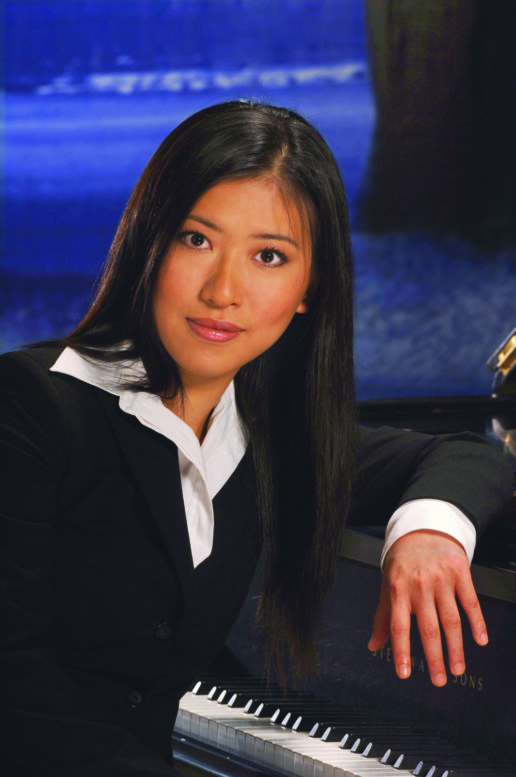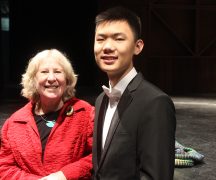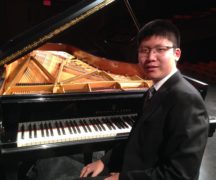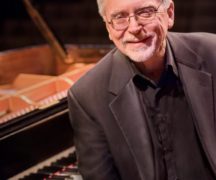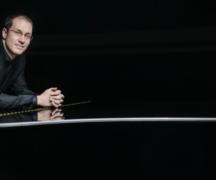By DAVID DUPONT
BG Independent News
When concert pianist Chu-Fang Huang listens to the finalists in the David Dubois Piano Festival and Competition Sunday morning, she wants the young musicians to tell her a story.
“More important than making your fingers move faster or more brilliantly, you need understand what the composer has to say. Otherwise playing the piano would be like being a blacksmith, just hammering.”
This epiphany ignited her passion for music. “I realized every piece of music is like a piece of literature. Every piece of music is like something by Shakespeare and Tolstoy. It’s just written in different language.”
She arrived at this understanding when she was 17, and a student at the Curtis Institute. She’d been playing for 10 years at that point easily winning many competitions. But her technical mastery driven by a strong competitive streak was not enough.
“If you want to crack the code, send the right kind of message, the right kind of emotions to your listener you must understand through the notes, the chords, the melody, what the composer is trying to say.” “I realized what a great world I’d gotten into, the great emotions and how affecting and touching those things can be,” Huang said in a recent telephone interview.
All this will come to the fore when she performs in recital Saturday at 8 p.m. in Bryan Recital Hall. Tickets are $7 in advance at: https://itkt.choicecrm.net/templates/BGSU/index.php or by calling 419-372-8171.
Her program will conclude with Maurice Ravel’s La Valse, a piece she performed in 2005 as winner of International Piano Competition and finalist in the Cliburn International Piano Competition.
In the flamboyant waltz, originally written for orchestra, Ravel depicts the European aristocracy on the brink of World War I who “didn’t want to face the fact that something was coming. They wanted to dwell in their luxurious lives while shooting was already happening outside their window. It’s a huge sarcasm Ravel pulls off.”
The Chopin sonata and ballade that she will play both speak to the composer’s love of his native Poland. The ballade is based on a Polish poem and his Second Sonata was written as Warsaw was falling to the Russian czar. The latter piece includes the famous funeral march.
Huang will also perform two pieces by Haydn, a composer she feels is underappreciated.
“Haydn speaks to me more than Beethoven and Mozart,” she said. His music is “humorous, fast changing, subtle.”
The story of Huang’s own career began before she even touched a keyboard. The only child of working parents, she was left to her own devices as a preschooler. So she turned to learning to read and do math. When she entered school at 6 she was ready to help her fellow students learn and willing to correct her teachers. This “goofy” behavior prompted her teachers to tell her parents that young Chu-Fang needed an outlet for all her energy.
So they asked her what she wanted to do. She had seen a pianist on TV playing with an orchestra. “I thought it was cool, so I said that’s what I want to do.”
At the time, buying a piano, even an upright, was “a huge investment,” she said. “To this day I’m grateful that they took child’s word and committed to it.”
And her parents demanded commitment in return. They insisted that until she was 18 she would stick to it.
“There were tears and times I wanted to stop,” Huang said. Those arguments continued well into her teen years, and spanned continents, as she moved to the United States to study.
Huang had success, winning competitions. “Everything came so easily,” she said “I won all the competitions I entered. When you get something without any struggle, any challenge, you take it for granted.”
And she had broad interests. Even as a child wanted to become a lawyer.
While studying at the Shenyang Music Conservatory, she played for Fernando Laires and Netila True, from the Eastman School of Music. They told her she should come to America to study, and recommended she attend Idyllwild Arts Academy in California where their former student Laura Melton taught.
After struggles getting a visa, she arrived in California at age 14 and studied with Melton. “She was like a mother to me.”
Melton now teaches at Bowling Green State University. She wrote the proposal that brought the Dubois competition to BGSU and continues to coordinate the event.
After a year and a half at Idyllwild, Huang started her college studies at the Curtis Institute in Philadelphia. Even at this point she was not committed to a musical career. She choose Curtis because it offered the option of a double major with the University of Pennsylvania.
When she got to Curtis she realized, for once, she was not the best pianist. “It really stimulated me,” she said.
“If I were to change my major, I better become the best or people would say ‘she didn’t chose another major, she was forced into another major because she wasn’t a very good pianist.’”
It was then that she moved beyond what her teachers told her the music meant, to connecting emotionally with the composer’s intention. “It was a monumental moment for me.”
This led her success at the Cliburn, in Cleveland and other competitions in the years immediately after she graduated from Curtis in 2004.
Competitions were crucial to her development. As a child, Huang said, they gave her the rare opportunity to play in front of an audience.
They also spurred her to practice. “I’m curious about everything in life especially when I was little,” she said. So she didn’t want to spend so much time at the keyboard. But she was also very competitive, so she knew she had to practice.
When she came to the States, her competition earnings helped fund her stay here, and then after Curtis they provided bookings for more concert engagements that launched her career.
The Dubois will bring 28 teenage pianists from around the country, including Chinese musicians, who like Huang, have come to study in the United States. (See list of semifinalists at: http://bgindependentmedia.org/teen-pianists-selected-to-compete-in-dubois-festival-at-bgsu-update/)
The competition’s semifinals round will be Saturday from 9 a.m. to 5 p.m. in Bryan with the finals beginning at 8:30 a.m. on Sunday.
Melton said the level of competitors has grown steadily since it began in 2012.
The winner receives $3,000 with the second place pianist receiving $2,000 and the third place $1,000.
Huang said it’s not just about the competition. “It’s an experience. It gives stage performance opportunities for performers.”
Those are crucial to truly mastering the music, she said. No matter how long a performer has been practicing a work, it will never reach fruition unless it is brought to the stage.
“When you have all that pressure and stimulation and adrenalin, a lot more problems are going to come out then if you’re just practicing,” Huang said. “By facing and overcoming those problems, the piece will become more attached to you.”
The music will become part of the performer’s story.

